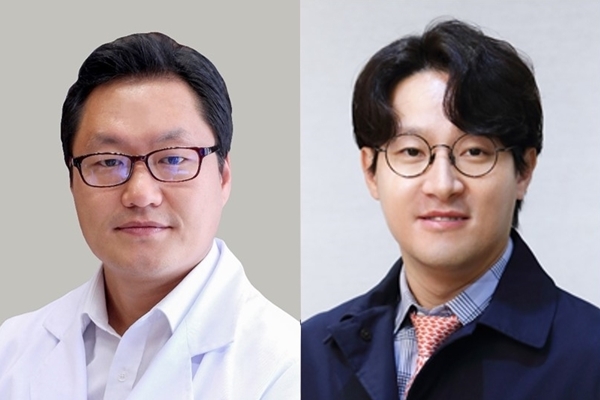-
- Global AMC MENU
- NEWS
- HEALTH
- PEOPLE
- Introduction

▲(from the left) Professor Jun Ki Kim of the Department of Convergence Medicine and Professor Sung Shin of the Division of Kidney and Pancreas Transplantation
After a kidney transplantation, invasive biopsies are performed to monitor rejection. However, these are difficult to repeat and accompany high risks of complications such as bleeding. A research team led by Professor Jun Ki Kim of the Department of Convergence Medicine and Professor Sung Shin of the Division of Kidney and Pancreas Transplantation at Asan Medical Center recently succeeded in employing biomarker detection and AI-based discriminant technology for early diagnosis of transplant rejection using a small amount of serum.
The research team focused on the fact that surface-enhanced Raman spectroscopy (SERS) can detect low-concentration analytes by increasing sensitivity through localized surface plasmon resonance (LSPR) modes of metallic materials. The team hypothesized that Raman patterns produced by various biomarkers in the serum can be analyzed with AI technology to facilitate a more precise diagnosis of transplant rejection.
The team analyzed the prognosis of rejection in kidney transplant patients and classified them into groups with no transplant rejection, antibody-mediated rejection, and T-cell-mediated rejection. The discriminant analysis process of the Raman signals was validated by assessing post-transplant kidney damage and function. Based on this assessment, the contribution of Raman signals to diagnostic accuracy relative to kidney damage was established. The discrimination accuracy for each type of rejection with AI-based analytic algorithms reached 93.53% for linear discriminant analysis and 98.82% for partial least squares discriminant analysis. The study suggests that, in the future, a minimally invasive, AI-based, high-sensitivity technique could provide more precise diagnoses of transplant rejection.
The research findings were recently published in ‘Biosensors and Bioelectronics,’ a prestigious journal in chemistry and biomedicine.












